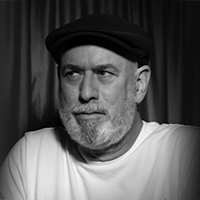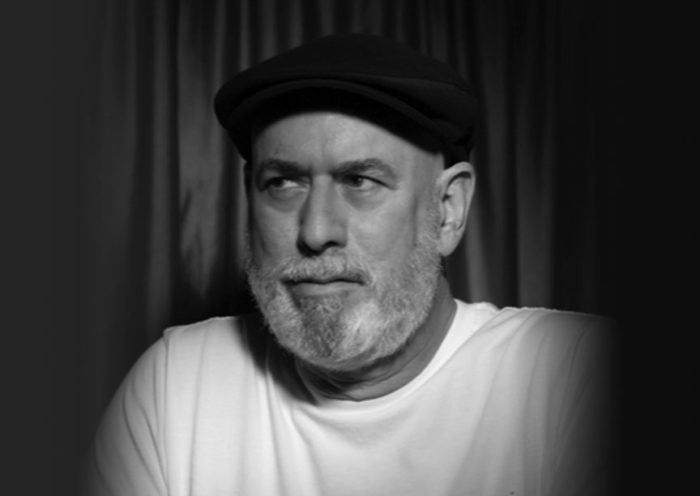Hung from a Mitzvah Cross
by Mark Tulin
April 6, 1968, was the day they tried to make me into a man. I remember the menagerie of Jewish images that filled the synagogue that morning: The Star of David shining through a big circular window on the ceiling, a man with curly sidelocks blowing the shofar, the Torah’s ancient scroll being unfurled by a young boy in a suit, worshipers rocking back and forth in prayer, and a white horse flying through the sky engraved in Hebrew lettering.
Despite this surreal moment, the day was not pleasurable. I wasn’t prepared to become a man. I just wanted to be a goofy kid in short pants, a T-shirt, and Hi-Top PF Flyers.
I didn’t understand the custom nor liked the fact that I would have to get up in front of a room full of people and read an ancient language.
The barrel-chested rabbi with his thick black book called me to the podium. “Marvin Hopper,” he said. “The only son of Mr. and Mrs. Hopper, please come forth.”
Maybe I should have practiced my Hebrew more. The tutor, Mr. Hershey, came over Grandma Edna’s house every Tuesday night, six-sharp. I spent an agonizing hour with a man I’d rather not know. While learning about my Jewish heritage was interesting, trying to pronounce Hebrew words was not. I’d much rather be outside with my friends, swinging a baseball bat than being cooped up in the living room with a man who smelled of garlic.
I blamed the whole bar mitzvah debacle on Grandma Edna. She wanted me to become a man in the worst way. She kept telling me that this is what Jewish people have done for centuries, and I was not going to “screw up” such a beautiful tradition.
Mr. Hershey, with his duct-taped bifocals and sparse hair, stood over me during our Hebrew lessons. He wore a white sleeveless shirt, revealing his ape-like arms. The bushy arm hair traveled all the way from his neck to the middle of his fingers. All I could think about was how hairy his arms were and not the Hebrew lesson I was supposed to be doing.
Grandma was in the kitchen boiling eggs and chopping onions for tuna fish salad. The grinding sound of the electric can opener signaled to me that she was prying open a can of Star-Kist White Albacore.
Although I was grateful for Mr. Hershey’s help, I was hungry for a tuna fish sandwich on toast with a slice of tomato.
“Chhhah,” Mr. Hershey said, making a guttural sound with his mouth wide open. “Like Challah.”
“Chhalah,” I said.
“Now close the back of your throat as if you were going to cough up some phlegm.”
“Chhalah,” I said more forcefully.
“Good boy,” he smiled and handed me a tissue to wipe the phlegm from my lips.
Eventually, I was able to say, Barukh atah Adonai, Eloheinu, melekh ha ‘olam without too much struggle.
I repeated the words over and over, hoping that some noble truth would click. I’d go to sleep reciting these words and dreaming about them as if they were people.
The longer I sat with Mr. Hershey, the more he perspired a garlicky odor. It wasn’t the worst smell I ever encountered, but bad enough. I kept watching the cuckoo clock on top of the television console, hoping that the mechanical bird would pop out to notify me that I could unloosen my hands from the mitzvah cross and run for freedom.
On the day of the big event, I sat near the podium, scanning the crowd, watching my aunts, uncles, cousins, and friends nervously crumple the napkins with my name printed on it. They waited in quiet anticipation for me to give them something to cheer about. I hoped that they would be forgiving when I embarrassed myself. My leather tefillin, silk prayer shawl, and plush yarmulke could not hide the fact that I was a bar mitzvah boy fraud and had no idea what I was doing.
An old man wearing a black trench coat with a long, flowing beard caught my eye at the buffet table. He stuffed his deep coat pockets with prune hamantasch, rye bread, and assorted meats. He took a bottle of Manischewitz Concord and promptly put that into his pocket as well. I wrote him off as nothing more than an employee of the synagogue who was just doing his job.
The rabbi spoke a few words to open the service. I secretly prayed that he’d forget that I was to his left and proceed with a regular Shabbat service without me. But then he mentioned my name and the bar mitzvah in the same sentence, and I knew that I was doomed.
Once at the podium, I looked out into the crowd of staring faces and froze.
Seeing my wide-eyed stupor, the rabbi sneaked behind me and whispered, “Read these three lines in Hebrew. I’ll take over from there.”
I took a gulp of air, and this time I was all right.
I uttered the three lines of Hebrew, not worrying if I pronounced them correctly. Most of my family members didn’t know a lick of Hebrew, so they wouldn’t know the difference between a good reading and a bad one.
When I finished my three lines, the crowd applauded like I just gave the Gettysburg Address.
The rabbi led a song in Hebrew, and everyone in the place was bobbing back and forth in their seats trying to repeat the words.
After the ceremony, my father stepped to the podium in his Florsheim boots and polyester suit and gave me and a giant hug.
“My little bar mitzvah boy,” he said, and gave my neck a squeeze for good measure.
Rich Uncle Sy didn’t say a word as he handed me a white envelope. He just winked.
My cousins, Hermie and Jacob, congratulated me with awkward handshakes, then nudged by Aunt Joanie to hand me their envelopes.
Grandma Edna, with her head full of hairspray, planted a sloppy kiss on my cheek while she stuck a lime-green envelope in my hand.
My alcoholic, Uncle Leo, was sleeping in the back of the synagogue with one hand in his pants and the other holding a card with a check inside.
My mother snatched all the envelopes out of my hand and put them in an old cigar box that she saved from elementary school.
As the rest of the family and friends congratulated me, I felt like I had truly accomplished something, even though it was only three lines of Hebrew. For the next hour, we ate sandwiches, potato salad, and drank Pepsi. Uncle Dave from Shamokin played the accordion, and his son Louis played the snare drum. I was happy that everyone was having fun even though I didn’t like Polka music. In another few hours, I could remove my suit and tie and act like none of this ever happened.
“Where’s the box?!” Where’s the box?!” my mother screamed, breaking up the festivity.
“I put all the envelopes in the cigar box—now it’s gone!” she cried.
“Where did you have it last?” my father asked.
“Right here, on the chair for Christ sakes!”
“Please, honey, you can’t say Christ in a synagogue. Are you sure you didn’t leave it in the lady’s room?”
“No, it was right on this chair—now it’s gone!”
My mother was very organized, especially when it came to money. She would never misplace something so important.
The rabbi went to console my mother, who, by now, had worked herself into a full-blown panic attack.
I stood near the podium, looking at everyone in their suits and fancy dresses searching for the cigar box. Rays of light shone down from the big circular Star of David in the ceiling window. The mosaic of the white horse on the wall seemed to glimmer from the sun. Then I remembered the old man with the long, flowing beard.
“Rabbi!” I said, tugging the back of his sport jacket. “There was a strange old man with a long white beard who hung around the buffet table, shoveling food and wine into his coat pockets.”
“Old man?”
“Yes, he wore a long black overcoat, a big dark hat covering his eyes, and had a white beard that came to his chest. I thought he worked for the synagogue.”
The rabbi scratched his neatly-cropped goatee, trying to think who I was talking about.
“I don’t know anyone by that description, Marvin. He certainly didn’t work here.”
After thirty-minutes or so everyone calmed down. My family figured out that most of the money was in the form of a check. And all they had to do was cancel the checks and write me out new ones.
Uncle Leo finally woke up and took his hand out of his pants. “What’s all the commotion?” he asked.
Everyone laughed because they knew that my Uncle Leo was a hopeless drunk and out of the loop. The rabbi motioned people to get back to their seats because he wanted to make an announcement.
“I’m so sorry that this happened. The thief will be reported, I can assure you. Let us not concern ourselves with him any longer. What has happened on the podium today far outweighs what one individual might have done to dampen our celebration. There’s a young man to my left who needs all of our love and support as he continues his journey into adulthood. It is all our jobs to see that he becomes a moral and responsible person in society—to harness his intellect, emotions, and actions in the service of God. It is he that is our priority. Today he took the first step.”
“Such a young man!” “So handsome and mature!” I heard people shout out.
Everyone was so proud of me, but the only thing I thought about was that in another few hours I could take off my Glenn plaid bar mitzvah suit and cordovan wing-tips and go back to being a regular kid.
BIO
 Mark Tulin is a former family therapist who lives in Santa Barbara, California. He has a poetry chapbook, Magical Yogis, published by Prolific Press (2017), and he has an upcoming book of short stories entitled, The Asthmatic Kid and Other Stories. His stories and poetry have appeared in Fiction on the Web, smokebox, Friday Flash Fiction, Amethyst Magazine, Leaves of Ink, Vita Brevis, among others. His website is Crow On The Wire <http://www.crowonthewire.com/ >
Mark Tulin is a former family therapist who lives in Santa Barbara, California. He has a poetry chapbook, Magical Yogis, published by Prolific Press (2017), and he has an upcoming book of short stories entitled, The Asthmatic Kid and Other Stories. His stories and poetry have appeared in Fiction on the Web, smokebox, Friday Flash Fiction, Amethyst Magazine, Leaves of Ink, Vita Brevis, among others. His website is Crow On The Wire <http://www.crowonthewire.com/ >



















What a great story and lively cast of characters. There’s definitely a time and place for Polka music!